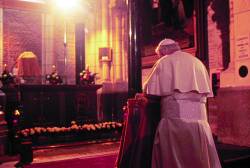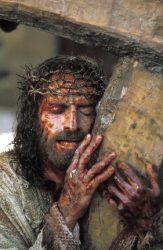Have a blessed Year

"To you, dear Brother Bishops, I commend this Year (of the Eucharist), confident that you will welcome my invitation with full apostolic zeal.
"Dear priests, who repeat the words of consecration each day, and are witnesses and heralds of the great miracle of love which takes place at your hands: be challenged by the grace of this special Year; celebrate Holy Mass each day with the same joy and fervour with which you celebrated your first Mass, and willingly spend time in prayer before the tabernacle.
"May this be a Year of grace also for you, deacons, who are so closely engaged in the ministry of the word and the service of the altar. I ask you, lectors, acolytes and extraordinary ministers of holy communion, to become ever more aware of the gift you have received in the service entrusted to you for a more worthy celebration of the Eucharist.
"In particular I appeal to you, the priests of the future. During your time in the seminary make every effort to experience the beauty not only of taking part daily in Holy Mass, but also of spending a certain amount of time in dialogue with the Eucharistic Lord.
"Consecrated men and women, called by that very consecration to more prolonged contemplation: never forget that Jesus in the tabernacle wants you to be at his side, so that he can fill your hearts with the experience of his friendship, which alone gives meaning and fulfilment to your lives.
"May all of you, the Christian faithful, rediscover the gift of the Eucharist as light and strength for your daily lives in the world, in the exercise of your respective professions amid so many different situations. Rediscover this above all in order to experience fully the beauty and the mission of the family.
"I have great expectations of you, young people, as I look forward to our meeting at the next World Youth Day in Cologne. The theme of our meeting—'We have come to worship him'—suggests how you can best experience this Eucharistic year.
"Bring to your encounter with Jesus, hidden in the Eucharist, all the enthusiasm of your age, all your hopes, all your desire to love."
John Paul II, Apostolic Letter Mane Nobiscum Domine, 30
 A Penitent Blogger
A Penitent Blogger



















